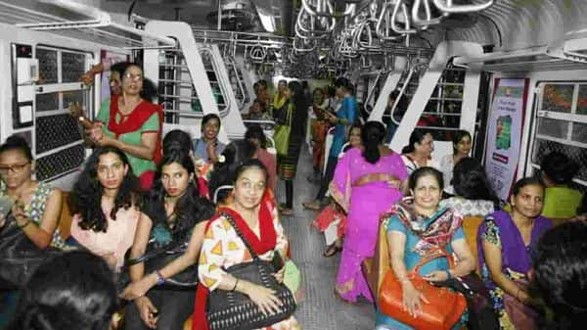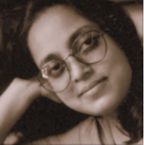TRANSLATED FROM THE BENGALI BY CHIRAYATA CHAKRABORTY
You had only seen the world through a little window, Mononita. No, the train windows were yet to come. Before them, you hadn’t seen much of anything. Because you hadn’t seen the ladies compartment. You had seen books, you had seen the National Library, you had seen the young “can I talk to you at the Gol Park bus stop at 2 after library?” men. You had even seen that old man who came to your house early in the morning to beg and ran a hungry hand all over your twelve-year-old body. Then it all crawled right under the covers of your books. Your colossal scholarship was your armor, I know, and that’s exactly what your parents wanted too. You hadn’t seen the ladies compartment.
You sat for your many exams. You passed. You got a job. You’re learning to break your neck for the “greater good”, you’re learning what a pay scale is, you’re learning the venomous envy of your male coworkers, you’re learning to live in a whole new world. The ladies compartment.
The ears that once listened to Rabindrasangeet, now listen to the squeaking of train doors and windows. You saw yourself grow up in a box. A cultural cubbyhole. You read those books your parents asked you to, stayed within those pallid, whitewashed walls, listened to endless academic drivel. School was simple. The girls were all domestic and down to earth. Your father was posted in Midnapore then.
But where is Midnapore now, and where is the low-sitting road that ran down the edges of Rishra, Bhadreshwar and Srirampur. The next few years after that were spent in Kolkata, letting loose with the boys in the college corridors. The rest was washed in a hard disinfectant. Now, on the train you hear them say, ‘They sleep in till nine. Door closed. You can hear everything! Ah… Ah… Ah…” No, no, no! Close your eyes, plug your ears!
These women worked houses, cleaned, washed dishes; ground grains and spices on muzzled empty stomachs. Some cradled babies, some crutched the old. They got sores from cleaning up old peoples’ piss and shit. Oil cloths. White, foreign stains on printed bed sheets.
You’re the local train infidel. A daily heretic. You stare at the sky and think about sarees. Salwar sets haven’t seized Bengali working woman sensibilities yet. A B-C-S officer! Deputy magistrate, deputy collector. Big words! You go to work in your saree in swagger. Light, starched and ironed cotton sarees on hot days, and synthetics and chiffons on rainy days. You wear silks in the winter. The two glorious silks. The only ones that you have. One day when you went to Naihati, you found that Sambalpuri silk saree at Khadi and felt yourself blessed by all thirty three crore gods. In the morning, you stuff your face and take the Bandel train from Howrah Station with food still lingering in the corners of your mouth. And you go against the current, fight for your life to get to your train. You run past the stinky fish sacks from Andhra, over the lagoon of melting fish ice, and through the thick trail of sweat and stench of men, towards the ladies compartment.
The cradling and crutching women accompany you as they go back home, chewing tobacco, dozing off, cutting their employers to pieces. It’s been a few months. You already can’t take it anymore, this train, this ever-occurring newness. New upon new, stacked up on your chest like those books you used to read. You aren’t used to this yet. Buying those fresh cucumbers with your puffed rice, that’s all you’ve learned to do.
Baba says, “Here, take this notebook. Write down all the hawker cries you hear on the way for me, won’t you?” Maa says, “Don’t get on anything that’s not reserved for women, you hear me? Here, I’ve packed two boxes for you. One for lunch, one for the evening. And you look sweaty as a pig when you get back. Do you go to bed like that?”
It’s a different world in the ladies compartment. It’s not cell-phone era yet, so you’re not sitting there with your earphones lodged insistently in your ear-holes. You would have liked to listen to music on the way, but you can’t carry your Rabindrasangeeth with you. You took your Walkman with you once or twice, but it doesn’t look good for a girl your age, with her illustrious job and her pretty-lady sarees.
Green. Dark green, light green. Pea green, sage green. You watch them go by on your hour-long commute. The world outside the train windows has somewhat of a Robi-thakur feel to it, you think. Cool, clean, like a phenyl-washed floor. It reminds you of his songs. You hum to yourself.
It’s all just a bit of escapism for you. Their buying of sarees in installments now, loud-voiced complaints about mother-in-law’s then. Shrill quarrels with rice-hustling chalwalis in the middle. The roaring rite of beating the idiot boys off of the ladies compartment.
The District Collector’s is another circus altogether. This attachment, that attachment. The baffling number of departments. You can’t keep count of them all. The DM is in meetings all day like Lord Shiva. And the BCS officers rumble angrily at being worked all day by the IAS officer. And the non-stop gloating.
A secret, not-so-secret racism. A secret, not-so-secret resentment. An apartheid.
There’s this young ADM who plays tennis with the DM. He has never looked at you. How could he, with his nose so high up in the air? And the BCSs that bitch about the bosses. Some are even (passive) aggressive to their own colleagues. Paresh babu can’t stand Ramesh babu. They don’t talk to each other anymore. Satishda would never step into Nitishda’s chamber, because Nitishda is a Hooghly-Kolkata networker. It’s his home after all. Satishda has just come to Hooghly, back from his Purulia exile, after spending the most important fourteen years of his life there. His wife’s gone. His home-life projects on his work rapports.
Some of them love to impart sticky pats on the backs of female probationers. Subarnada offers a thick, brown, disgusting tea that he boils in heavy milk and douses with gluey, moist sugar. Apparently he has a borrowing problem, so all colleagues dodge him whenever they can. He’s in Motor Vehicles and when he sets out to spook truck drivers, he takes Mononita with him. The other probationers, Sushmita, Tapa, avoid him.
There’s Harinath Sen who sits on the other side of Mononita’s table. He dozes and attests documents all day. He used to be an alcoholic, but now gets high on Corex. Everyday, a peon brings him a bottle. He has an “understanding” with the pharmacy. He dozes and he attests, and once in a while, chugs a Corex.
Mononita is about to be a BDO. What will she do with her English books then? How will she live in her tall tower with the little window? She would have to handle Zilla Parishads, local heads; Panchayat leaders.
A BDO is supposed to have a database… at least that’s what it says on paper. A BDO should be a custodian to some information about each Gram Panchayat. The list of beneficiaries for the Indira Awas Yojna, a list of names under each Gram Panchayat, all families and their heads. The list of those who aren’t yet under the Yojana, what’s called the “permanent waitlist”. The list of BPL card holders. All of these ideals need to be implemented. All the schemes, the Annapurna scheme, the Rural Road scheme, the Skill Development scheme. The NREGA. The Planning Commission is constantly working on more. There’s going to be a food security bill soon.
You have got to understand the machinery. Work is slow, lazy. The funds are never fully utilized. There’s so much unspent money the state gives back to the center at the end of each financial year. The database is incomplete. There are plenty of people who are left out of the BPL list. The party makes the list, so there are shadow card holders. All BPL cards are kept with the party middle-man. What’s even funnier, is that the criterion for the scheme itself doesn’t make any sense! 12 rupees! A person needs to be earning 12 rupees daily to be above poverty line. What does a man get in 12 rupees? That’s not even 2000 a year. Under the PDS, that is, the rationing system, every family is supposed to be given 35 kilograms of wheat per month. Is the wheat even making it to them?
There’s a senior officer, Chaitidi. A muffasal girl. She’s already got some clout, an older-sister air about her. She’s always chewing on her paan, but she’s good at her job. They’ve let you sit with her. She’s basically adopted you. She’s a bit of a smart aleck though. She called you a few minutes ago and said, “I have the jeep, let’s go take a ride.”
Go where?
To the hospital. She needed to get a dying declaration from the district hospital. The DM asked her to take “that one probationer” with her.
The DM’s Bihari. His Bengali is choppy. “You guys do a talk yourself”, he says all the time. So, you became ‘that one’ probationer, but you still don’t know what’s going on.
Chaitidi said, “a girl’s got fourth degree burns. She’s going to die, for sure.”
“So?”
“So… she’s going to need a magistrate before she kicks the bucket.”
“Huh?”
“Arey baba, when there’s a burn case, and a girl, especially married, is brought to the burn ward, the police needs to know how it happened, right? If it was an accident or an attack. In other words, if her in-laws need to be put behind bars, get it?”
“Oh, right. So, we need to go get a statement from her, yeah? The victim?”
“Obviously, under Indian Evidence Act, section 32. A deputy magistrate needs to do it. Hence, the ride.”
“So, if she says her in-laws did it, the police can make a case against them?”
“Yep, Suo Moto.”
“Can her own family sue them?”
“If they’re informed, sure. It’s a village affair. Sometimes they don’t even inform the family. But more importantly, if she’s burnt to a crisp, she won’t be able to say a word. That is why we need to get there and write a statement for her. That statement is going to need my signature. Do you get it now? How important this is?”, she said, smirking.
The hospital made something churn deep inside you. It was packed with people. Heaps of filth everywhere, and huddles of people next to them.
The stinging chemical odors. The odd mixture of chlorine, bleach, phenyl and rotting blood made your stomach turn.
An office. The two of you met the Super first. The scuffling of official papers, scratching of signatures. Then they took you to the… what was it called again? Oh yes, Female Burn Ward. Upon ten metal beds lay ten half burnt, fully burnt, kind of burnt women. Some whimpered, some just lay there, their eyes shut. White bandages. Blistering, sickly bodies. Bodies shrinking from malnutrition, wrapped in filthy bed covers.
And on the floor… the floor… no, you can’t bring yourself to look at the floor.
Ten more women on the floor, on their own beddings. Their own dirty, miserable beddings. They lay in blood, pus and vomit. There are one or two nurses for the nursing of twenty. There are buckets for vomit at the heads and urinals for piss at the feet, and three dogs roam freely in the ward.
Your patient is laid at a far corner of the ward. There are no doctors, only a nurse sits beside her on the floor, her legs stretched out in front of her. You go and stand in front of them, and try to remind yourself why you took this job. Chaitidi stands with a stony look on her face. If she was feeling anything in that moment, she did not let it show.
The girl’s body looks like black, charred wood. Only a light, white piece of cloth is laid on top of her, because bodies burned to that degree cannot be clothed. Her fleshy, swollen, throbbing burns make her no longer look human. There is no meaning to protecting her modesty now.
The pink, swollen burns are now drying, and her nerves are responding to it with immeasurable pain. It is this pain that will kill her, the Super Doctor had said, picking his teeth with a safety pin.
Actually, with this unmoving, strange, black, gnarled body, it was hard to tell if it was a man’s or a woman’s. You couldn’t tell at first glance that it was even alive. But you knew because you had met the doctor, and now it was your noble duty to take her dying declaration, to record it, and so, Chaitidi knelt down to bring her face close to the girl’s, and asked, “Where do you live?” Her head was placed on the pillow peculiarly. Her eyeballs were exposed, wide open, almost motionless. And blood red.
Hhhh… hhhh…
You couldn’t hear a thing. It’s not as if she could speak. Her lips were burnt off, and in its place, the ghastly pink of her mouth was bared, her gums and teeth exposed.
How did you catch on fire?
Hhhh… Gghh…
She was really trying to say something. Her throat quivered with sound.
Bubbles of the IV travelled to her hand steadily. The girl twitched.
Did someone do this to you?
She’s saying something, but you don’t understand what it is.
Gghh… Hhhh…
You didn’t think to buy yourself fresh cucumbers and puffed rice on your ride back home that evening. You had no energy to. And yet, you had come back to the office untainted. Chaitidi had scrunched up her nose and said, “It smelled horrible in there!”, as she produced the report: there were no accusations from the girl; she had not named any names; her words were indecipherable.
That noble duty was fulfilled! Then there was luchi and curry for lunch. And you understood… people like you, like Chaitidi, like the alcoholic Harinath Sen… you and those people were not the same. You could live right next to them, but you could never understand them. You live in a different world, look at their world through a little window. And then that window shuts itself neatly. Just like it did now.
Mononita, you look at the ladies’ compartment. You see a scratch on the forehead of the girl sitting next to you. Could be imaginary.
Wasn’t there a lump on top of that woman’s head? And a bruise next to it?
They’re sleeping, buying sarees, being beaten up by their husbands. They’re marrying their sixteen year old daughters off on a loan. She either comes back in a year, or smolders somewhere secretly.
You look around. The bowel-baring E.M.U. coach rattles its bones and flees through grasslands and woodlands meaninglessly. And the women who sit on the floor, at the doors, even when there are seats empty, with their sacks of rice, for that sweet wind, and yell at climbing hawkers, in their synthetic sarees, blouses with no buttons, only safetypinned modesty, money hidden in handkerchiefs stuffed in between their breasts, crossing railway lines ticketless, they shout constantly in a language unknown. The sound resounds over the huffing of the trains, but they mean nothing to you. Never did. Gghh… Hhhh… Shhh…You don’t understand what they’re saying.
Glossary:
Chalwalis: Women who used to sell smuggled/off-ration rice on trains.
DM: District Magistrate
BCS: Bengal Civil Services
IAS: Indian Administrative Service
ADM: Additional District Magistrate
BDO: Block Development Officer
Gram Panchayat: It is a basic village council in India, the smallest level of governance in India’s federal system, where the head or Pradhan is elected by the people directly.
BPL: Below Poverty Line
NREGA: National Rural Employment Guarantee Act, 2005
Also, read “REMEDY— SAYEED AZAAD TRANSLATED FROM THE BENGALI BY BISHNUPRIYA CHOWDHURI”, and published in The Antonym:
Follow The Antonym’s Facebook page and Instagram account for more content and exciting updates.




























0 Comments